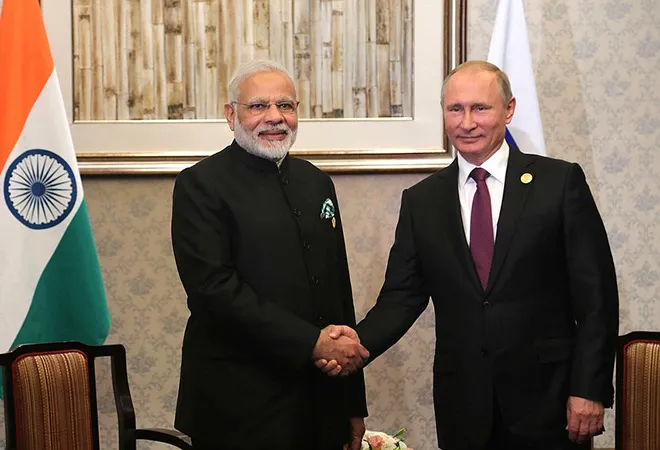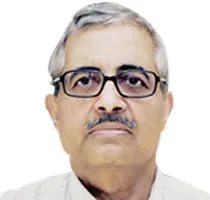Russia’s President Vladimir Putin is arriving in India on December 6 for the traditional annual summit between leaders of India and Russia. This visit is a year overdue, postponed last year because of the Covid pandemic. The visit comes at a time of increased speculation about the future of India-Russia ties and hopefully will provide some answers to that vexing question.
This expectation is buttressed by the symbolism imbued in the visit even before it has started. This is Putin’s second visit outside Russia this year, the first was in June to meet US President Joe Biden in Geneva. Putin has skipped visits to the G-20, the climate change meet in Glasgow and rescheduled a planned visit to China, because of the pandemic. Thus, Putin is indicating that his visit is not about just maintaining the “special, privileged strategic partnership” with India but deepening bilateral ties. This despite New Delhi’s growing closeness to Washington.
Putin has skipped visits to the G-20, the climate change meet in Glasgow and rescheduled a planned visit to China, because of the pandemic.
Beyond symbolism
The relationship in the past couple of years has seen many symbolic gestures from both sides. Putin in 2019 bestowed the Order of St Andrew on Modi, who is the only foreign dignitary to receive this highest Russian decoration.
Moscow also shed its ‘neutrality” between India and China to support New Delhi at the UN in the aftermath of the decision to abrogate Article 370 as well as expedite weapons to India during the border tensions with China in the Himalayas in 2020.
India has reciprocated in the United Nations, most recently, by supporting Russia on Crimea and co-sponsoring a resolution on fighting against glorification of Nazism. Additionally, the Russians value India’s resolve to buy the S-400 Air Defence system, despite the threat of US sanctions.
The relationship is, however, not only rich with symbolism. In the past two years Russia has reclaimed the top spot as India’s arms supplier, while actively seeking to engage with the ‘Make in India’ programme, energy cooperation is growing rapidly, new areas of pharmaceuticals, ceramics, chemicals, high-tech industry, cyber, digital finance, are being explored to boost economic ties. India has promised to contribute to the development of Russia’s Far East – highlighting this commitment with the first-ever one-billion-dollar credit line to promote Indian business in the region.
However, despite substantial progress in the past couple of years, it is self-evident that the bilateral relationship cannot be insulated from the strategic and economic churn taking place in international affairs.
India has promised to contribute to the development of Russia’s Far East – highlighting this commitment with the first-ever one-billion-dollar credit line to promote Indian business in the region.
Moreover, some areas of difference will be difficult to ignore given that both Russia and India are cosying up to different partners involved in the geo-political rivalry between US and China – the first is a primary adversary of Russia and the second India’s main opponent. In this context, it is important that close dialogue be maintained between New Delhi and Moscow to maximise convergences and minimise divergences.
First, a differing understanding of the Indo-Pacific concept and the re-emergence of the Quad — comprising Australia, Japan, the US, and India — should not be allowed to grow into a major obstacle. Russian foreign minister Sergey Lavrov has been openly sceptical and harsh about the concept of the Indo-Pacific, which he sees as a US strategy to contain China, and maybe even Russia.
Lavrov appears impervious to the negative resonance these words evoke in India. In all fairness, it must be noted that Putin himself has been far more moderate in his utterances on the Indo-Pacific and the Quad.
However, there is a growing debate among Russia’s elites about the Indo-Pacific concept and a growing appreciation that there are several versions of the idea and that India’s vision of the Indo-Pacific differs from the one enunciated by the United States. External affairs minister, Dr S. Jaishankar’s invitation, voiced during his July visit to Moscow, for Russia to play a greater role in the Indo-Pacific, has added grist to the mill.
Russia’s elites were already discussing the need for Russia to increase its engagement in the Indian Ocean region, where they believe India plays an important role. Russian strategists believe that signing the Reciprocal Exchange of Logistics Agreement (RELOS) during Putin’s visit and greater diplomatic contact in the Indian Ocean Rim Association (IORA) will strengthen this process.
Lavrov’s insensitive decision to go to Islamabad from Delhi in April, a misstep avoided by his illustrious Soviet predecessor, Andrey Gromyko, 50 long years ago, only added to the disappointment of Indian policy makers.
Trust issues
The second area of divergence, till recently, was Afghanistan. But the messy US withdrawal and Taliban coming to power in Kabul, have brought India and Russia closer, even though some nuances may remain. Linked to this is the growing Russian involvement with Pakistan that roils the public imagination in India. Lavrov’s insensitive decision to go to Islamabad from Delhi in April, a misstep avoided by his illustrious Soviet predecessor, Andrey Gromyko, 50 long years ago, only added to the disappointment of Indian policy makers.
The third area of possible bilateral tension is the apparent lack of trust in how far the two are ready to go with their new strategic partners — India with the US and Russia with China. However, there is an overarching shared goal that should help India and Russia overcome all issues of trust. New Delhi and Moscow abhor the idea of the emergence of a hegemon or a dominant power in Asia or Europe. It is this common understanding that should motivate a vibrant India-Russia partnership to ensure a multipolar Asia and Europe.
Finally, the fourth area that requires urgent and sustained attention is the economic relationship. Despite the promise it holds, trade is abysmally low when compared to India’s trade with the US or Russia’s trade with China. Efforts are being made by India to increase its engagement with the Russian economy.
This is reciprocated by Russia’s eagerness to participate in the Make in India programme. There is a rich history of successful joint ventures from Bhilai to Brahmos. Economic ties are primarily government to government.
Without private sector involvement, Indo-Russian economic ties will find it difficult to grow beyond a point. The business elites of the two countries are remarkably ill-informed about each other. There is an urgent need to set up bilateral networks to overcome the dependence on Western media for information about one another.
One presidential visit is not likely to magically remove all these irritants, but the rich agenda of the visit suggests that policymakers are aware of the challenges and the need to address them quickly.
The summit will be preceded by the recently instituted 2+2 dialogue between the defence and foreign minister of the two countries. The economic Joint Commission is also set to meet before Modi and Putin sit down for their talks. There is also a rich panoply of defence and economic agreements lined up.
Ultimately, the only way India and Russia can prevent their relationship from being buffeted by the changing winds of world geopolitics and geoeconomics is if they are able to write themselves into each other’s national development stories. That will guarantee a warm and long friendship.
This commentary originally appeared in Times of India.
The views expressed above belong to the author(s). ORF research and analyses now available on Telegram! Click here to access our curated content — blogs, longforms and interviews.

